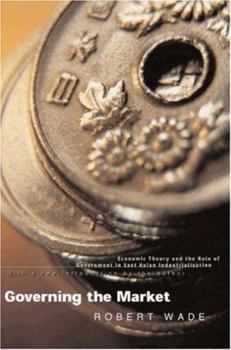Governing the Market: Economic Theory and the Role of Government in East Asian Industrialization
Select Format
Select Condition 
Book Overview
Published originally in 1990 to critical acclaim, Robert Wade's Governing the Market quickly established itself as a standard in contemporary political economy. In it, Wade challenged claims both of those who saw the East Asian story as a vindication of free market principles and of those who attributed the success of Taiwan and other countries to government intervention. Instead, Wade turned attention to the way allocation decisions were divided...
Format:Paperback
Language:English
ISBN:0691003971
ISBN13:9780691003979
Release Date:February 1992
Publisher:Princeton University Press
Length:456 Pages
Weight:1.40 lbs.
Dimensions:1.1" x 6.2" x 9.2"
Customer Reviews
2 ratings
Brilliant Study in Heterodox Economic Growth Theory
Published by Thriftbooks.com User , 15 years ago
Robert Wade's 'Governing the Market' is a landmark text in development economics. Southeast Asian Tigers are often used to describe the success inherent through trade and market liberalization. What Wade discovers is that this finding is only skin deep. The economic policies of all the Tigers were far from 'free' and often manipulated the market to focus on total production rather than marginal efficiency. Wade focuses on Taiwan (with comparisons to Japan and South Korea). Taiwan developed a dualistic economy where most of the businesses (~70%) were small firms that operated on a relatively free market. However, the rest of the economy (which accounts for most of the countries production) were highly regulated and controlled by government intervention. Taiwan's government led the market by coercing private firms into investing in new industries that were deemed economically viable. When a private firm would not step in the government went ahead and formed their own public enterprises (which account for a large part of Taiwan's economy). Through highly selective use of import-substitution and export-promotion strategies the economy flourished with unprecedented growth. The other Tigers followed a similar path as Taiwan, South Korea, and Japan but without selective development policy. This is predominantly why they had lower growth rates. Even Hong Kong, the neoliberal bastion of success, turns out to be a highly regulated economy (p331-333 is essential reading). Wade comes to a disturbing conclusion: Benevolent authoritarian rule may be necessary for developing nations to thrive. Without authoritarian corporatism it may be very difficult for growth to occur. The 2003 version is highly preferred to the original because of a new, comprehensive, introduction. The introduction gives a response to critics of 'Governing the Market' and a thorough explanation of the Asian Financial Crisis. The introduction alone is worth the price of most texts. I highly recommend this to anyone interested in economic growth theory.
Classic on the taiwanese developmental state
Published by Thriftbooks.com User , 16 years ago
"Governing the Market" is almost certainly the seminal work on Taiwan's economic development. The work gives a detailed account of the ways in which state intervention actively promoted economic growth, contrary to the protestations of the IMF-led "Washington Consensus". Rather than focusing on polemical argument, as is so often the case in political economy, Wade's study is extremely detailed and persuasive, explaining both the economics, but also the politics of corruption (and how even corruption can be harnessed into economic productivity). Personally, I think Wade may have underestimated the importance of widespread education, effective infrastructure, and significant quantities of US aid compared with other parts of the developing world as "lubricants" to jump-starting the economy. Nevertheless, his argument that the state-imposed redistribution of agricultural land went a long ways to generating the necessary surplus for development is solid. Wade also recognizes that this surplus was then harnessed by a government savings-and-loan structure that facilitated capital investment in domestic heavy industry (the "commanding heights" of the economy) - often a difficult task to accomplish. As Wade convincingly contends, there was a significant amount of East Asian-style Fabian socialism involved in Taiwan's development - and the Taiwanese were remarkably successful because of it - despite some of the roadbumps encountered by others who tried to replicate the model (the quasi-successful states of SE Asia: Malaysia, Thailand, and Indonesia). The first 150 pages of this volume and the conclusion, at minimum, are a must-read for any serious student of developmental economics or political economy. This edition is especially useful because the introduction convincingly addresses claims that rent-seeking led to the 1997-8 crisis with substantial evidence (supported by even conservative economists like Jagdish Bhagwati at Columbia) that excessive portfolio liberalization in the real estate sector was the leading cause of the 1997-8 crash - and even accounting for this, Taiwan and South Korea each recovered remarkably well in a short period of time, and have now joined the ranks of the first world.





